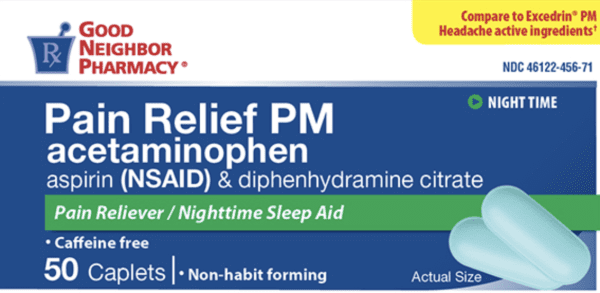Acetaminophen/aspirin/diphenhydramine Interactions
There are 817 drugs known to interact with acetaminophen/aspirin/diphenhydramine, along with 20 disease interactions, and 3 alcohol/food interactions. Of the total drug interactions, 82 are major, 707 are moderate, and 28 are minor.
- View all 817 medications that may interact with acetaminophen/aspirin/diphenhydramine
- View acetaminophen/aspirin/diphenhydramine alcohol/food interactions (3)
- View acetaminophen/aspirin/diphenhydramine disease interactions (20)
Most frequently checked interactions
View interaction reports for acetaminophen / aspirin / diphenhydramine and the medicines listed below.
- Benadryl Allergy (diphenhydramine)
- Bevyxxa (betrixaban)
- Bromfed DM (brompheniramine / dextromethorphan / pseudoephedrine)
- Buproban (bupropion)
- Centrum Silver (multivitamin with minerals)
- Daily Combo (multivitamin with minerals)
- Fish Oil (omega-3 polyunsaturated fatty acids)
- Flomax (tamsulosin)
- Gas-X (simethicone)
- Gemtesa (vibegron)
- Janumet XR (metformin / sitagliptin)
- Januvia (sitagliptin)
- Jardiance (empagliflozin)
- Metoprolol Succinate ER (metoprolol)
- Mounjaro (tirzepatide)
- Mucinex DM (dextromethorphan / guaifenesin)
- One A Day Men's Complete (multivitamin with minerals)
- Paracetamol (acetaminophen)
- Pepcid (famotidine)
- PreserVision (multivitamin with minerals)
- Sleep Aid (doxylamine)
- Suphedrine PE Sinus Headache (acetaminophen / phenylephrine)
- Tinactin (tolnaftate topical)
- Tylenol (acetaminophen)
- Tylenol Arthritis Pain (acetaminophen)
- Vicks Dayquil Daytime Cold / Flu (old formulation) (acetaminophen / dextromethorphan / pseudoephedrine)
- Vicks NyQuil Cold & Flu Nighttime Relief (acetaminophen / dextromethorphan / doxylamine)
- Vitamin C (ascorbic acid)
- Wal-itin (loratadine)
- Zoloft (sertraline)
Acetaminophen/aspirin/diphenhydramine alcohol/food interactions
There are 3 alcohol/food interactions with acetaminophen / aspirin / diphenhydramine.
Acetaminophen/aspirin/diphenhydramine disease interactions
There are 20 disease interactions with acetaminophen / aspirin / diphenhydramine which include:
- alcoholism
- liver disease
- depression
- coagulation
- asthma
- GI toxicity
- renal dysfunction
- Reye's syndrome
- PKU
- anticholinergic effects
- asthma/COPD
- cardiovascular
- renal/liver disease
- glaucoma
- liver disease
- resp depression
- anemia
- dialysis
- G-6-PD deficiency
- hepatotoxicity
Drug Interaction Classification
| Highly clinically significant. Avoid combinations; the risk of the interaction outweighs the benefit. | |
| Moderately clinically significant. Usually avoid combinations; use it only under special circumstances. | |
| Minimally clinically significant. Minimize risk; assess risk and consider an alternative drug, take steps to circumvent the interaction risk and/or institute a monitoring plan. | |
| No interaction information available. |
See also:
Further information
Always consult your healthcare provider to ensure the information displayed on this page applies to your personal circumstances.


